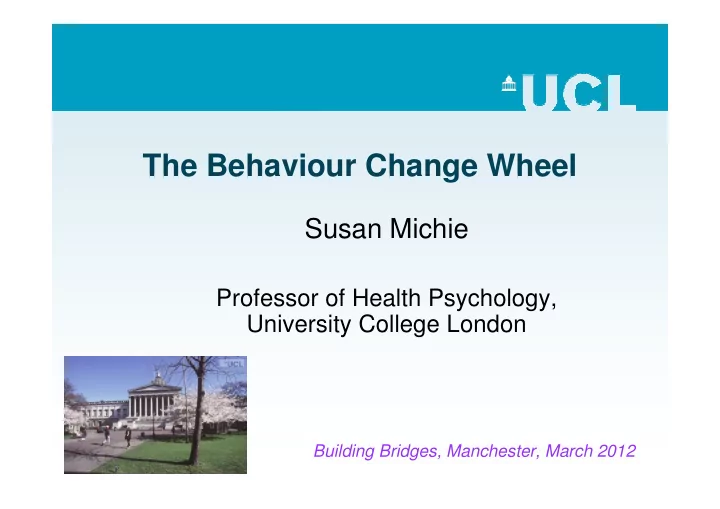

The Behaviour Change Wheel Susan Michie Professor of Health Psychology, University College London Building Bridges, Manchester, March 2012
The Problem • “Lifestyle” behaviours: major cause of illness and premature death 48% avoidable deaths in US in 2000 from – smoking – alcohol use 75% – poor diet – physical activity – unsafe sex – driving habits – violence Mokdad et al, 2004
Changing Behaviour: main messages • It is not easy • There is evidence of “what works” • Interventions and policies are insufficiently evidence-based (House of Lords report, 2011) • Make our interventions evidence-based, including “every contact counts”
This talk • What works? – NICE’s Behaviour Change guidance (2007) • The Behaviour Change Wheel – Understand the behaviour – Consider all the options • Two examples of applying the evidence – NHS Health Trainers – Giving brief advice (example of smoking)
NICE Guidance for Behaviour Some effective principles of Change (2007) individual behaviour change • Strengthen motivation to engage in the desired behaviour • Reduce motivation to continue with the undesired behaviour • Maximise “self-regulatory” capacity • Maximise supportive activities
A comprehensive approach • Start with understanding the target behaviour in context • Consider the range of possible evidence-based interventions and policies • Build research into – service delivery and – improvement mechanisms – to ensure we build solid evidence about “what works”
The COM-B system: Behaviour occurs as an interaction between ... Psychological or physical ability to enact the behaviour Reflective and automatic mechanisms that activate or inhibit behaviour Physical and social environment that enables the behaviour
The Behaviour Change Wheel • A comprehensive framework for behaviour change interventions • Based on systematic review of 19 frameworks • Has COM-B model of behaviour at its hub Michie et al (2011) The Behaviour Change Wheel: a new method for characterising and designing behaviour change interventions, Implementation Science.
COM-B system
Interventions : activities designed to change behaviours
Policies : decisions made by authorities concerning interventions
Interventions are made up of specific behaviour change techniques (BCTs) (Abraham & Michie, 2008) ��������������������� 1. General information ������������������������� 2. Information on consequences ���������������������� 3. Information about approval 4. Prompt intention formation ���������������������� � ��!�������"�"���"�� 5. Specific goal setting �#��$���������"������ 6. Graded tasks %&��$��������""���'������� 7. Barrier identification 8. Behavioral contract %���(��������� %%������"����������� 9. Review goals %)��(���"���"��������� 10. Provide instruction %���$���������������� 11. Model/ demonstrate 12. Prompt practice %���*������������������������ %������������������ 13. Prompt monitoring
Further development • Smoking cessation: 53 BCTs Michie et al, Annals Behavioral Medicine, 2010 • Physical activity & healthy eating: 40 BCTs Michie et al, Psychology & Health, 2011 • Reducing excessive alcohol use: 42 BCTs Michie et al, Addiction, in press • General behaviour change: 137 BCTs Michie et al, Applied Psychology: An International Review, 2008 • Current MRC funded study: 86 BCTs www.ucl.ac.uk/health-psychology/BCTtaxonomy 13
Smoking: evidence based techniques and policies Advise on stop- Smoking ban smoking medication Under the Facilitate relapse counter prevention and coping Seek commitment Advise on changing routine
Intervention functions Under the counter Smoking ban Facilitate relapse prevention and coping Advise on stop- smoking medication Advise on changing routine Seek commitment
Evidence-based behaviour change interventions • NHS Health Trainers • NHS Centre for Smoking Cessation and Training www.ncsct.co.uk Website: ncsct.co.uk – Directors McEwen, West, Michie (UCL)
The NHS Health Trainer Service • From the local community – with knowledge of the locality and its disadvantaged groups • Trained in behaviour change techniques – to motivate, support and teach self-regulation skills – to work with client in setting personalised health goals & action plans • 1200+ HTs serving clients in England and Wales
2008/9 national audit • 632 Health Trainers – 27,762 clients • 47% from most deprived population quintile
Main results • 93% set goals & made action plans – 51% achieved goals, 31% part-achieved • Behaviour change – More fruit & veg, less fried snacks, more physical activity sessions – Reduced smoking, alcohol use – Reduced BMI, where diet or activity PHPs – Increased self-efficacy, perceived health & wellbeing • Change similar across deprivation groups
For those making action plans: Diet improved Outcome N Pre-HTS Post-HTS Cohen’s d p mean mean Daily fruit 2376 3.08 5.23 <.001 0.97 & veg (portions) No. of daily 1145 1.99 0.79 <.001 -0.85 fried snacks BMI 3164 34.33 32.45 <.001 -0.30 (Cohen’s d: Small = .20, Medium = .50, Large = .80)
Physical Activity increased Outcome N Pre-HTS Post-HTS Cohen’s d p mean mean Weekly 921 3.06 4.77 <.001 0.42 moderate sessions Weekly 637 0.63 1.71 <.001 0.46 intensive sessions BMI 595 32.46 31.24 <.001 -0.18
NHS Stop-Smoking Services • The NHS Stop-Smoking Services treat >700,000 smokers each year and have maintained success rates as numbers treated have grown • However success rates are variable and could be improved 0.7 0.6 te ra s 0.5 s ce c 0.4 u s d 0.3 rifie e 0.2 -v O C 0.1 0 PCT
NHS Centre for Smoking Cessation and Training: From evidence to practice … • Evidence of effective interventions from “gold standard” trials (Cochrane reviews) – Identify specific behaviour change techniques within effective interventions • Establish professional competences – required to deliver these techniques • Provide training to deliver these techniques Website: ncsct.co.uk
Make every contact count … • “Very Brief Advice”: a minute or two • Too short to change behaviour • Long enough to – Motivate – Signpost to specialist – “Make your contact count”
Very Brief Advice: a minute or two • What the evidence says – Ask – if they are smoking – Advise – on how best to stop smoking – Act – make a referral or offer a prescription • Apply these principles to – all behaviours, and – the hospital setting
Extract from the VBA online course www.ncsct.co.uk/vba
���������� • To change behaviour – Understand the behaviour – Use evidence-based techniques +�������� • Your questions? • How can you apply Very Brief Advice to your setting?
Recommend
More recommend